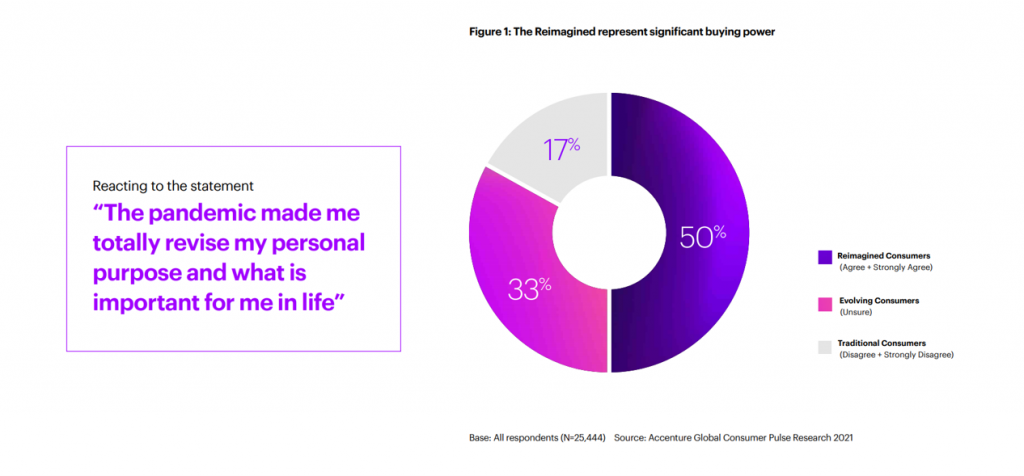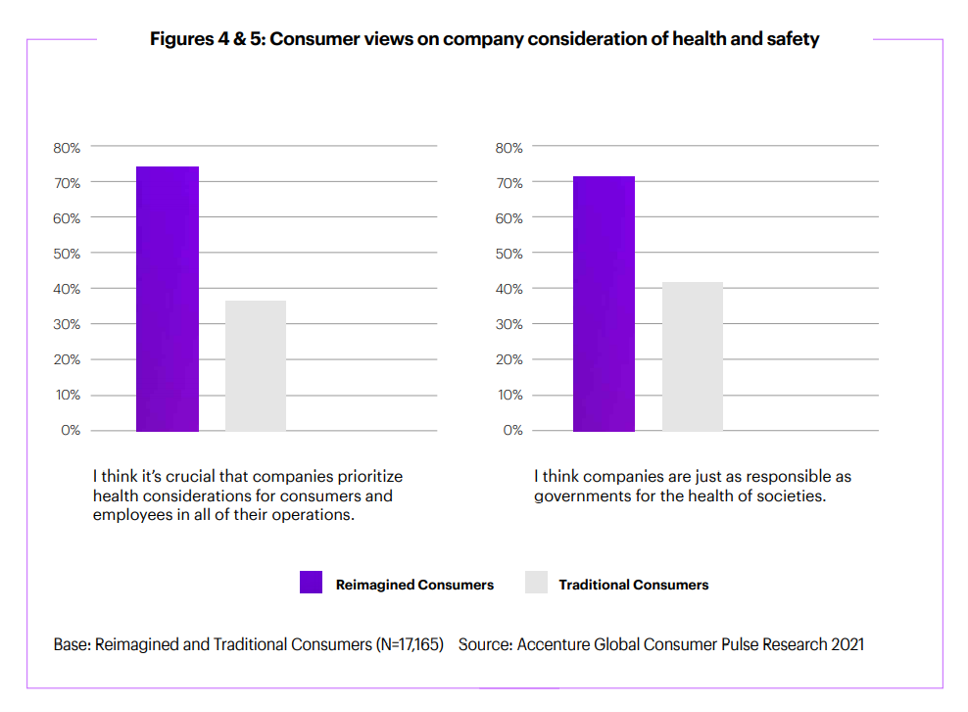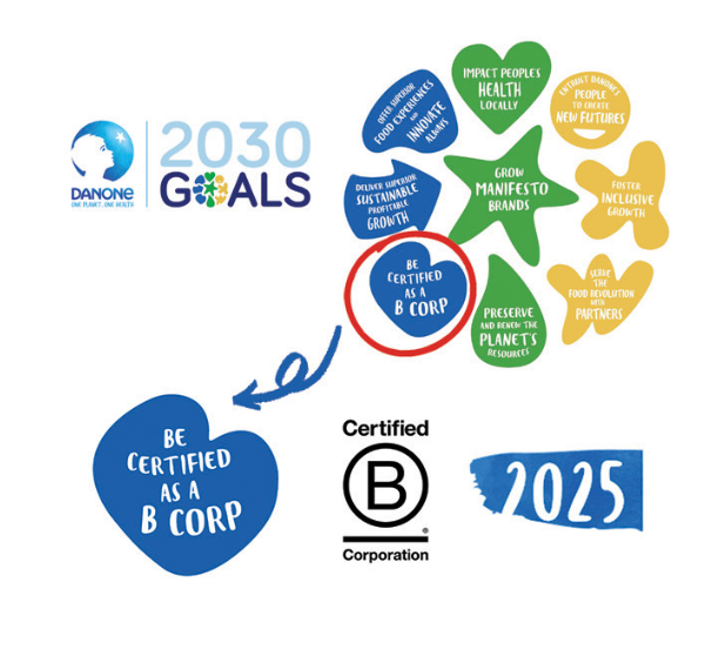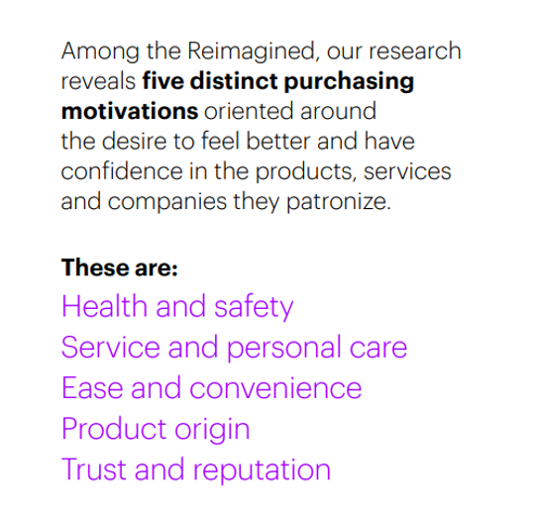COVID-19 reshaped people around the world, one-half of whom are re-defining their personal purpose and life-goals. This sense of purpose extends to peoples’ willingness to buy or patronize companies who do not meet their needs for health, safety, sustainability and trust.
 For example, two in three of these people would switch travel brands if they felt health and safety weren’t up to par, discovered in Life Reimagined – Mapping the motivations that matter for today’s consumers, from Accenture’s Voices of Change series.
For example, two in three of these people would switch travel brands if they felt health and safety weren’t up to par, discovered in Life Reimagined – Mapping the motivations that matter for today’s consumers, from Accenture’s Voices of Change series.
In May 2021, Accenture polled over 25,000 consumers globally, in 22 countries, and found that one-half of people the world over are rethinking their sense of purpose and priorities.
These folks are the “Reimagined.” A top priority for these consumers is health and safety, along with service and personal care, ease and convenience, product origin, and trust and reputation.
 It’s important to know that the Reimagined consumers aren’t necessarily younger, more affluent, or fitting in a particular race or ethnic group. This is a heterogenous bunch of people who seek more empathy and purpose from the organizations they buy from and patronize. A major sentiment among the Reimagined is that companies have disappointed them by not providing enough support and understanding for their needs during challenging times.
It’s important to know that the Reimagined consumers aren’t necessarily younger, more affluent, or fitting in a particular race or ethnic group. This is a heterogenous bunch of people who seek more empathy and purpose from the organizations they buy from and patronize. A major sentiment among the Reimagined is that companies have disappointed them by not providing enough support and understanding for their needs during challenging times.
The Reimagined over-index when it comes to demanding companies prioritize health considerations for consumers and employees across their operations.
Furthermore, 7 in 10 of the Reimagined folks think companies are just as responsible as governments for the health of societies.
While 2020 was a year that compelled new consumer behaviors like hand-washing, physical distancing, and donning masks, the Reimagined look to companies to embrace health and safety in both mission and operations.
As a signal of change, Accenture pointed to Ipsos’s newly-designed Consumer Health & Safety Index which tracks retailers’ performance on health and safety based on consumers’ perceptions (FYI, Costco and Whole Foods came out well in that first Index report].
 Health Populi’s Hot Points: That consumers increasingly look to the private sector to be responsible for public health has not gone unnoticed by commercial companies. Pre-pandemic, we saw the likes of CVS/pharmacy morph into CVS/health in 2014 with their abolishing the sale of tobacco products, rebranding and reorganizing as a vertically integrated health/care company. Dick’s Sporting Goods and Walmart responded to mass gun shootings by withdrawing certain ammunition from store shelves in 2019. Health insurance plans have begun to invest in housing and food programs that address the risks of long-overlooked social determinants of health. Consumer goods companies, such as beauty brands and food manufacturers, accelerated their plans for greater sustainability and health baked into their products, such as Unilever’s growing attention to ingredients, Danone’s filing as a B Corporation, and Best Buy pivoting toward supporting healthy aging at home.
Health Populi’s Hot Points: That consumers increasingly look to the private sector to be responsible for public health has not gone unnoticed by commercial companies. Pre-pandemic, we saw the likes of CVS/pharmacy morph into CVS/health in 2014 with their abolishing the sale of tobacco products, rebranding and reorganizing as a vertically integrated health/care company. Dick’s Sporting Goods and Walmart responded to mass gun shootings by withdrawing certain ammunition from store shelves in 2019. Health insurance plans have begun to invest in housing and food programs that address the risks of long-overlooked social determinants of health. Consumer goods companies, such as beauty brands and food manufacturers, accelerated their plans for greater sustainability and health baked into their products, such as Unilever’s growing attention to ingredients, Danone’s filing as a B Corporation, and Best Buy pivoting toward supporting healthy aging at home.
See Danone’s 2030 goals here, with “impact people’s health locally” as a north star, encompassing 2 of the U.N.’s 17 Sustainable Development Goals (SDGs): #2 to get to “zero hunger,” and #3 to bolster good health and well-being.
Before COVID-19, a popular business mantra was that “every company is a tech company.”
Accenture’s research bolsters the next Business 101 mantra that “every company is a health company.”
This will be an integral component in organizations keen to embrace and demonstrate corporate commitment to ESG Principles — where the “S” for “Social” is especially potent for health, healthcare, and well-being.





 Interviewed live on BNN Bloomberg (Canada) on the market for GLP-1 drugs for weight loss and their impact on both the health care system and consumer goods and services -- notably, food, nutrition, retail health, gyms, and other sectors.
Interviewed live on BNN Bloomberg (Canada) on the market for GLP-1 drugs for weight loss and their impact on both the health care system and consumer goods and services -- notably, food, nutrition, retail health, gyms, and other sectors. Thank you, Feedspot, for
Thank you, Feedspot, for  As you may know, I have been splitting work- and living-time between the U.S. and the E.U., most recently living in and working from Brussels. In the month of September 2024, I'll be splitting time between London and other parts of the U.K., and Italy where I'll be working with clients on consumer health, self-care and home care focused on food-as-medicine, digital health, business and scenario planning for the future...
As you may know, I have been splitting work- and living-time between the U.S. and the E.U., most recently living in and working from Brussels. In the month of September 2024, I'll be splitting time between London and other parts of the U.K., and Italy where I'll be working with clients on consumer health, self-care and home care focused on food-as-medicine, digital health, business and scenario planning for the future...